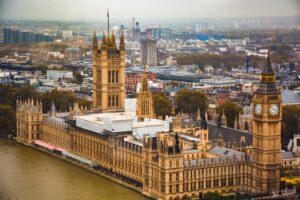
The State Opening of Parliament and the King’s Speech will take place on Wednesday 17th July 2024. Here is Connect's, our Parlimentary Advisor, preview of what legislation we could expect from this key moment for the new Government.
Employment Rights Bill – Elements of Labour’s new deal for workers are expected
to need some legislative basis. Angela Rayner has confirmed the Government will
establish a Fair Work Agency to amalgamate the Gangmasters and Labour Abuse Authority, National Minimum Wage Unit and the Employment Agency Standards Inspectorate. This new agency will have power to levy fines and bring forward prosecutions.
Housing and Planning Bill – Labour have already announced several non-legislative reforms, and more can be expected in the King’s Speech including potential changes to the NPPF and reintroduction of housing targets and definitions of green belt. The manifesto also pledges to increase social and affordable housing and build several new towns.
Devolution Bill – Labour’s manifesto promised to take powers out of Westminster and devolve them to the regions and nations. ‘Labour will transfer power out of Westminster, and into our communities, with landmark devolution legislation to take back control.’ This is likely to be an extensive piece of legislation or a number of different bills.
Renters Reform Bill – The previous Government dropped the Bill which contained measures to scrap Section 21 evictions, Labour have committed to abolishing them and to introduce legislation to overhaul the regulator.
Local Growth Bill – Labour’s manifesto pledges to introduce a new statutory requirement for Local Growth Plans that cover towns and cities across the country.
OBR Powers Bill – Labour have committed to giving the OBR powers to independently
publish forecasts for major fiscal events.
Industrial Strategy Bill – Whilst unclear what elements of an industrial strategy will need legislation, the Labour manifesto makes clear they will establish an Industrial Strategy Council which has a statutory basis.
Economy Bill – Labour have made several promises on this front, including legislating to tackle late payments, modernise HMRC and change the law to tackle tax avoidance.
Border Security Bill – As Labour seek to tackle illegal migration, they will likely be repealing elements of Conservative Government legislation and introducing new terrorism style powers and serious crime prevention orders.
Crime and Policing Bill – Likely to include new laws and reforms right across the policing and justice system, including a new offence of child criminal exploitation. This could also include a neighbourhood policing guarantee and new powers for the police inspectorate. There will likely be measures to crackdown on violence against women and girls, including a standalone offence of spiking, and tacking knife crime and antisocial behaviour.
The Protect Duty Bill (Martyn’s law) – Prior to the General Election, Starmer wrote to Figen Murray promising to introduce Martyn’s Law at the earliest possible opportunity.
Rail Nationalisation Bill – This Bill will likely ensure there is a legislative framework for the creation of Great British Railways. GBR will be the holding company for all of the rail franchises as they are taken into public ownership. There will also be the introduction of a new passenger watchdog.
Tech Regulation Bill – Labour’s manifesto commits to introducing binding regulation on the handful of companies developing the most powerful AI models and banning the creation of sexually explicit deep fakes.
Online Safety Bill – There were a number of measures Labour called for during the progress of the Online Safety Act 2023 that did not make the final legislation – such as giving coroners better access to material access by children on social media after their death – Labour pledged to resolve this.
Health and Social Care Bill – Labour’s plans for legislation in this area are lighter on detail but with one of the five missions being Building an NHS fit for the future, it is likely there will be some legislation in this area – potentially on social care or dentistry reform, or more drastic legislative measures to reduce NHS waiting lists.
Mental Health Bill – Labour’s manifesto pledged to modernise mental health legislation to give patients greater choice, autonomy, enhanced rights and support.
Conversion Therapy Ban Bill – The previous Government committed to banning conversion therapy, but never legislated for the ban. Labour’s manifesto says they will deliver a full trans-inclusive ban on conversion practices, while protecting the freedom for people to explore their sexual orientation and gender identity.
Tobacco and Vapes Bill – Labour committed to resurrecting this bill which fell at the dissolution of the last parliament. It would ban anyone aged 15 and under from ever buying cigarettes.
Education Bill – Lots of Labour’s proposals for education don’t necessarily need primary legislation, however we can expect some legislation around inspections and accountability building on New Labour’s Education and Inspections Act 2006.
School Support Staff Negotiating Body Restoration Bill – This legislation will likely restore the School Support Staff Negotiating Body Restoration. Abolished by Michael Gove after the 2010 election, Labour pledged to restore the support staff body, this could be contained within a wider Education Bill.
Energy Independence Act – Labour will create Great British Energy, a state-owned
company that will invest in renewables, with its base in Scotland and the manifesto
promised an Energy Independence Act that will establish the framework for Labour’s
energy and climate policies.
Water Bill – Labour’s manifesto committed to giving regulators new powers to block payments of bonuses to executives at certain water companies, and to bring criminal charges against lawbreakers.
Legacy Act Repeal – Labour pledged to ‘repeal and replace’ the Conservative Party’s
Legacy Act and to return to the principles of the Stormont House Agreement.
Football Governance Bill – Labour’s manifesto pledges to introduce a Football Governance Bill to establish an independent regulator to ensure financial sustainability of football clubs in England.
Duty of Candour Bill – Labour will introduce a ‘Hillsborough Law’ which will place a legal duty of candour on public servants and authorities and provide legal aid for victims of disasters or state related deaths.
Race Equality Act – Labour’s manifesto promised to introduce a landmark Race
Equality Act, to enshrine in law the full right to equal pay for Black, Asian, and other ethnic minority people, strengthen protections against dual discrimination and root out other racial inequalities.
Gambling Reform Bill – Labour’s manifesto commits to reforming gambling regulations and strengthening protections from gabling related harm.
Animal Welfare Bill – In their manifesto Labour committed to improving animal welfare with a ban on trail hunting and the import of hunting trophies, they will also work to end puppy smuggling and farming and look to phase out animal testing.
House of Lords Reform – Labour’s manifesto committed to immediate modernisation of the House of Lords with legislations to remove the right of hereditary peers to sit and vote in the House of Lords, as well as introducing a mandatory retirement age – they will consult on proposals for an elected chamber.
Democracy Bill – Through the campaign and in the manifesto, Labour have committed to lowering to voting age to 16 and introducing automatic voter registration.






